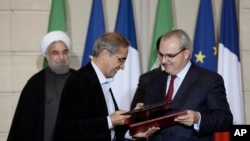Three months after the implementation of the Iran nuclear deal, banks and other corporations are wary of doing business in the country due to concerns over running afoul of U.S. sanctions, especially as U.S. lawmakers ponder a clampdown over Iran’s missile development.
The 2015 deal unfroze up to $100 billion in Iranian assets at overseas banks, loosened many restrictions on business transactions with the country, and reconnected Iranian banks to the SWIFT inter-bank global messaging system.
But companies complain they have yet to reap the benefits of tapping into Iran’s $415 billion economy.
Among those rushing to make deals in Iran was the aircraft manufacturing giant Airbus, which signed a deal in January for 118 airplanes to help replace the aging fleet of Iran’s flag carrier, Iran Air.
“I am very proud of all the Airbus teams who quickly mobilized to propose the agreements and make them happen,” said Fabrice Brégier, the company’s president said at the time.
Three months later, Airbus has yet to finalize the deal. Analysts and company officials, speaking anonymously, told VOA financing the deals remains a hurdle.
Banking concerns
Banks largely remain unclear on the U.S. rules governing the new relationship with Iran; many corporations fear that violating them may cause them to lose their licenses — and more lucrative business — in the United States.
“On the Iran side they’re concerned that international banks are not servicing the transactions. Banks are concerned about running afoul of U.S. sanctions today or in the future. So it’s a caution on the part of banks,” Mark Fitzpatrick, a non-proliferation analyst at the International Institute for Strategic Studies told VOA.
By most accounts, implementation of the agreement has gone smoothly, with Iran meeting its obligations to curb development of its nuclear program.
However, Iran’s test-firing of two ballistic missiles last month and its destabilizing actions in Yemen and Syria are fueling arguments by politicians in the U.S. to impose new sanctions on Tehran. Adding to the uncertainty are statements by Republican presidential front-runners Donald Trump and Ted Cruz, who have pledged to tear up the nuclear deal if they are elected.
The Obama administration is eager to see the agreement carried through. U.S. Treasury Secretary Jacob Lew has promised that the United States will meet its end of the deal and officials with his department, which is in charge of enforcing sanctions, have assured international banks that the U.S. will not block access to Iranian funds that were previously frozen.
But the United States at the same time has said its restrictions on Iranian transactions via U.S. banks will remain in place.
“We will not provide Iran access to the U.S. financial system and we will not restore the 'U-turn' authorization,” Acting Under Secretary of the Treasury Adam Szubin said in Washington this week, referring to U.S. dollar transactions that are temporarily cleared through U.S. financial institutions.




